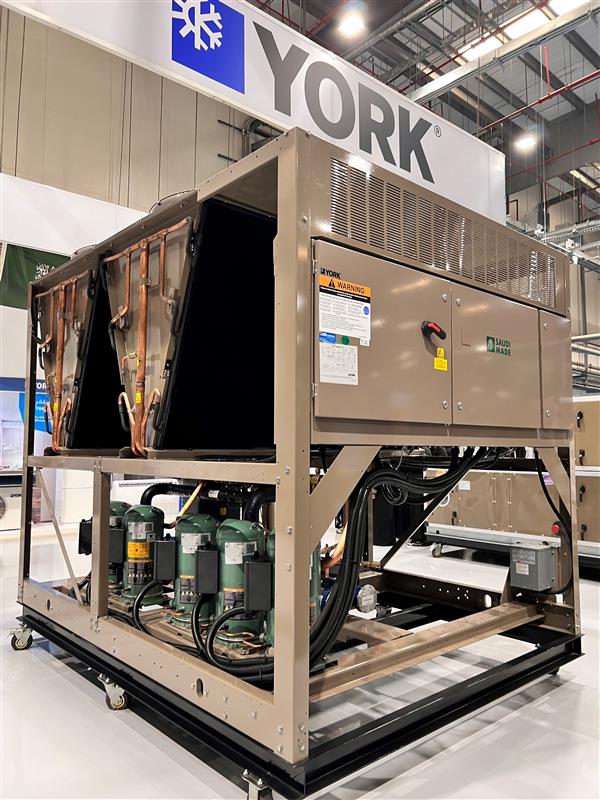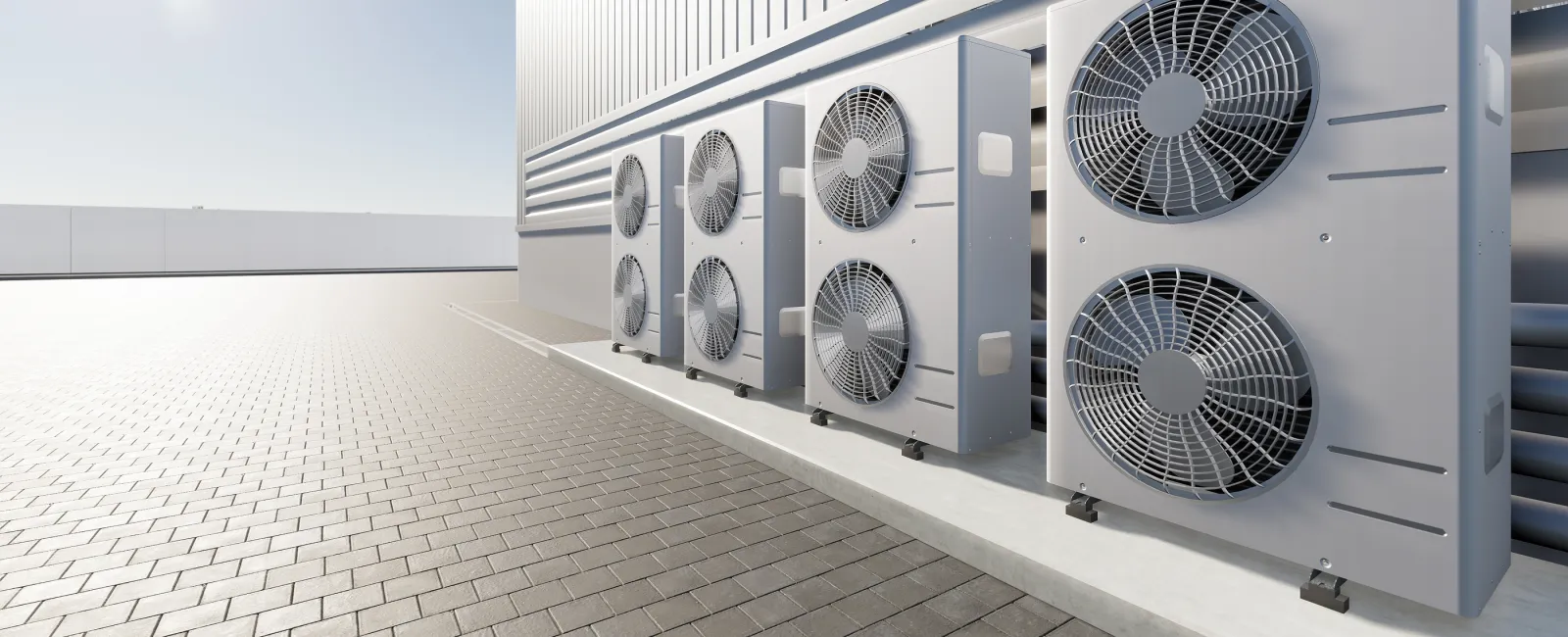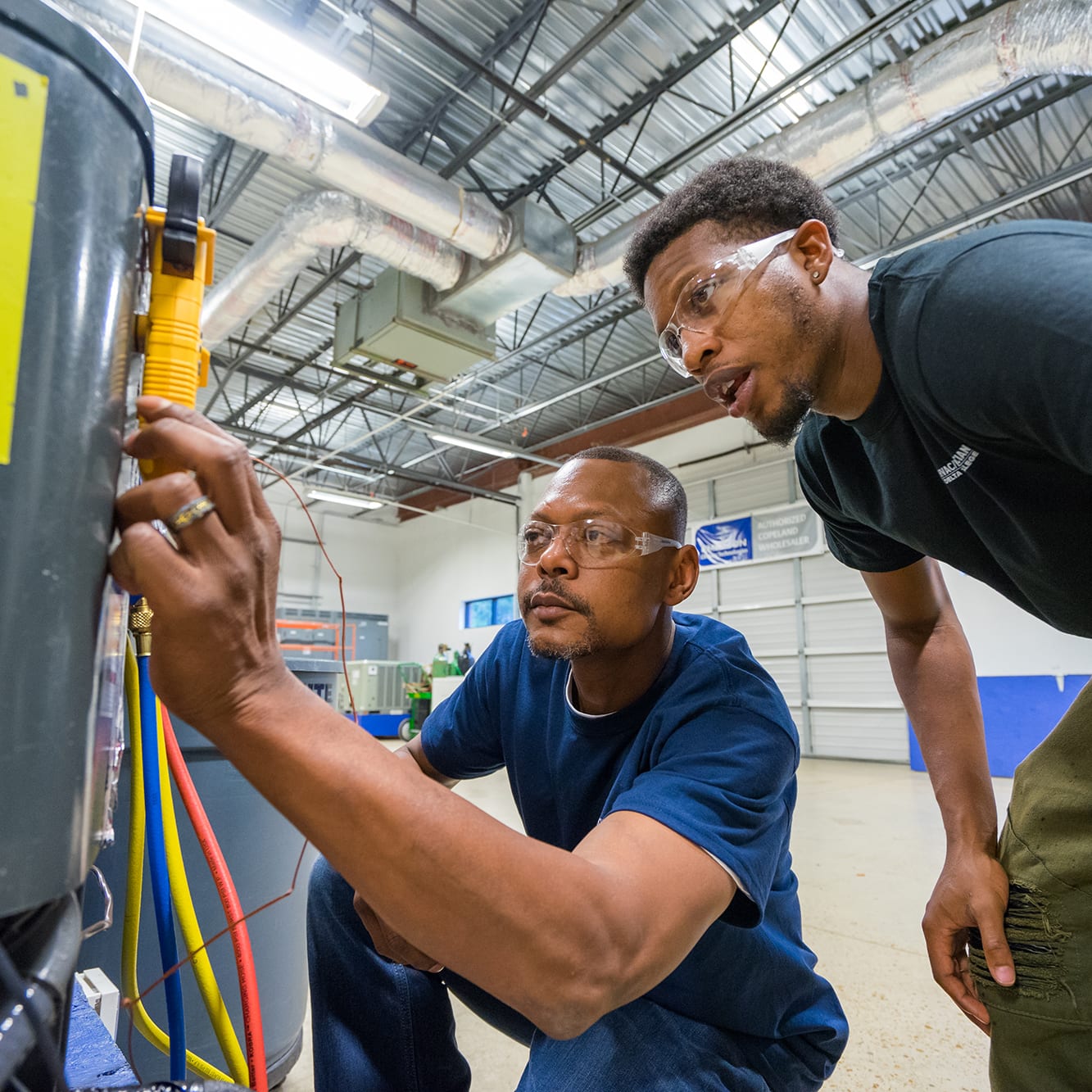Understand how HVAC experts ensure resilient HVAC solutions
Exploring the Crucial Parts of an Effective A/c System
A reliable heating and cooling system is constructed on numerous crucial elements that work in consistency. Each part, from the thermostat to the ductwork, plays an important duty in maintaining convenience and power efficiency. Recognizing these elements is essential for maximizing performance and improving indoor air top quality. As one examines these components, the complex partnerships between them expose understandings right into boosting overall system effectiveness. What specific factors add most to this performance?
The Duty of the Thermostat in Cooling And Heating Efficiency

Although frequently neglected, the thermostat plays a vital duty in the performance of heating and cooling systems. HVAC experts. This small gadget serves as the primary control facility, managing temperature level setups and making certain excellent convenience within an area. By accurately picking up the ambient temperature level, the thermostat communicates with the air flow, home heating, and air conditioning systems to maintain the wanted environment
An efficient thermostat decreases energy intake by triggering the a/c system just when necessary, thus stopping excessive home heating or cooling. Modern programmable and clever thermostats enhance this performance even more by permitting users to set routines and remotely adjust setups, adapting to daily routines.
The positioning of the thermostat is vital; inappropriate place can lead to imprecise temperature readings, resulting in inefficient procedure. Overall, a well-functioning thermostat not only improves comfort yet likewise contributes considerably to energy financial savings and the long life of the heating and cooling system.
Comprehending the Importance of Air Filters
Air filters offer a vital function in a/c systems by assuring that the air circulating within an area stays tidy and healthy. These filters catch dirt, allergens, and other contaminants, avoiding them from being recirculated throughout the atmosphere. By capturing these particles, air filters contribute to enhanced indoor air high quality, which can greatly profit occupants' health, specifically those with allergic reactions or respiratory problems.
Additionally, maintaining tidy air filters enhances the efficiency of cooling and heating systems. Clogged up filters can restrict air flow, causing the system to work tougher to preserve wanted temperature levels, bring about raised power consumption and greater utility expenses. Routinely replacing or cleaning filters is an essential upkeep action that can extend the life expectancy of heating and cooling devices. Ultimately, understanding the relevance of air filters permits home owners and building managers to take proactive actions to ensure a well-functioning, reliable a/c system that advertises a safe and comfy indoor atmosphere.

The Functionality of the Furnace and Heat Pump
Heaters and heatpump are vital components of heating and cooling systems, in charge of supplying warmth throughout chillier months. Heaters operate by home heating air through combustion or electrical resistance, then distributing it throughout the home through ducts. They normally supply quick home heating and can be fueled by gas, electrical energy, or oil, relying on the system kind.
Conversely, heatpump transfer warmth instead than generate it. They draw out warmth from the outdoors air or ground, also in low temperatures, and move it indoors. HVAC experts. This twin functionality allows heatpump to additionally offer air conditioning in warmer months, making them versatile alternatives for year-round climate control
Both systems require correct upkeep to assure performance and durability. While heaters master severe cold, warm pumps can be useful in moderate climates. Recognizing their distinct performances help homeowners in picking one of the most suitable choice for their heating needs.
Exploring the Air Conditioning System
The a/c device is a vital component of a/c systems, available in various types to suit various requirements. Understanding the efficiency ratings of these devices is necessary for making informed selections concerning power consumption and price. This section will certainly explore the diverse types of a/c unit and make clear how effectiveness scores effect efficiency.
Kinds Of Air Conditioners
While numerous factors affect the selection of air conditioning systems, comprehending the various kinds offered is crucial for property owners and building supervisors alike. Central air conditioning conditioners are created to cool down whole homes or buildings, using a network of air ducts for airflow. Home window devices provide a more localized solution, perfect for solitary rooms or tiny rooms. Portable ac unit give adaptability, permitting individuals to relocate the system as needed. Ductless mini-split systems are another alternative, incorporating the effectiveness of central systems with the comfort of zoning, as they need no ductwork. Geothermal systems harness the earth's temperature level for energy-efficient air conditioning. Each type includes distinctive advantages, making educated selections vital for effective climate control.

Performance Rankings Clarified
Comprehending effectiveness ratings is crucial for picking the ideal cooling system, as these metrics offer understanding into the system's efficiency and energy intake. The most usual rating for air conditioners is the Seasonal Power Efficiency Proportion (SEER), which measures the cooling result during a typical air conditioning season divided by the total electric power input. A higher SEER shows much better efficiency. Additionally, the Power Efficiency Proportion (EER) is utilized for determining efficiency under certain problems. An additional essential metric is the Power Celebrity certification, which indicates that an unit satisfies strict energy effectiveness standards. By evaluating these scores, customers can make informed options that not just optimize comfort yet also lower power costs and environmental effect.
The Value of Ductwork and Airflow
Efficient ductwork design and air flow monitoring play essential functions in the general performance and performance of cooling and heating systems. Correct ductwork guarantees that conditioned air is dispersed equally throughout an area, lessening temperature level fluctuations and boosting convenience. Properly designed air ducts lessen resistance to airflow, reducing the workload on heating and cooling devices and eventually reducing power usage.
Air flow monitoring entails strategically placing vents and signs up to boost the flow of air. This protects against usual problems such as cold or hot areas, which can occur when air movement is obstructed or improperly well balanced. Furthermore, the appropriate air duct products and insulation can further improve effectiveness by minimizing warm loss or gain during air transit.
An efficient ductwork system not only contributes to power savings yet can also prolong the life-span of cooling and heating devices by minimizing unnecessary strain (HVAC experts). Consequently, understanding the importance of ductwork and air movement is vital for accomplishing peak heating and cooling system performance
Normal Maintenance Practices to Enhance Efficiency
Normal upkeep methods are important for ensuring peak efficiency of cooling and heating systems. These methods consist of routine examinations, cleansing, and needed repairs to maintain the system running effectively. Frequently changing air filters is important, as clogged up filters can obstruct air movement and decrease efficiency. On top of that, service technicians must check and clean evaporator and condenser coils to avoid getting too hot and power wastefulness.
Annual professional examinations are also recommended, as qualified professionals can identify potential problems prior to they escalate. Lubing relocating components reduces deterioration, adding to a longer lifespan for the system. In addition, making sure that the thermostat operates appropriately help in maintaining ideal temperature control.

Regularly Asked Questions
How Typically Should I Change My Thermostat?
Thermostats must commonly be replaced every 5 to 10 years, depending upon use and technology improvements. Normal checks website are suggested to guarantee peak performance, particularly if experiencing irregular temperature level control or boosted energy costs.
What Dimension Air Filter Is Finest for My Cooling And Heating System?
The very best dimension air filter for a HVAC system differs by system design. Usually, it's crucial to get in touch with the proprietor's manual or examine the existing filter dimensions to assure peak efficiency and air quality.
Can I Mount a Heat Pump Myself?
Installing a heatpump individually is feasible for knowledgeable people, however it requires knowledge of electric systems and regional codes. Hiring a professional is advised to ensure appropriate installation and ideal system efficiency.
Exactly how Do I Know if My Ductwork Is Reliable?
To figure out ductwork performance, one should examine for leaks, measure air movement at vents, evaluate insulation high quality, and assess temperature distinctions between supply and return ducts. Expert assessments can give thorough understandings right into total efficiency.
What Are Signs My Heating And Cooling Needs Immediate Maintenance?
Signs that an a/c system needs immediate upkeep include uncommon noises, irregular temperature levels, enhanced energy bills, undesirable odors, and regular biking. Attending to these concerns quickly can protect against more damage and warranty peak system efficiency.
Air filters serve a vital function in HVAC systems by assuring that the air circulating within a room continues to be clean and healthy. In addition, keeping clean air filters improves the efficiency of Cooling and heating systems. Ductless mini-split systems are one more alternative, integrating the effectiveness of central systems with the comfort of zoning, as they require no ductwork. Recognizing efficiency ratings is essential for choosing the right air conditioning device, as these metrics provide insight into the system's performance and energy usage. The ideal size air filter for a Cooling and heating system varies by system layout.